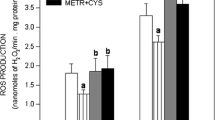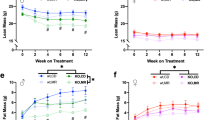Abstract
Methionine dietary restriction (MetR), like dietary restriction (DR), increases rodent maximum longevity. However, the mechanism responsible for the retardation of aging with MetR is still not entirely known. As DR decreases oxidative damage and mitochondrial free radical production, it is plausible to hypothesize that a decrease in oxidative stress is the mechanism for longevity extension with MetR. In the present investigation male Wistar rats were subjected to isocaloric 40% MetR during 7 weeks. It was found that 40% MetR decreases heart mitochondrial ROS production at complex I during forward electron flow, lowers oxidative damage to mitochondrial DNA and proteins, and decreases the degree of methylation of genomic DNA. No significant changes occurred for mitochondrial oxygen consumption, the amounts of the four respiratory complexes (I to IV), and the mitochondrial protein apoptosis-inducing factor (AIF). These results indicate that methionine can be the dietary factor responsible for the decrease in mitochondrial ROS generation and oxidative stress, and likely for part of the increase in longevity, that takes place during DR. They also highlight some of the mechanisms involved in the generation of these beneficial effects.
Similar content being viewed by others
References
Asunción JG, Millan A, Pla R, Bruseghini L, Esteras A, Pallardo FV, Sastre J, Viña J (1996) Mitochondrial glutathione oxidation correlates with age-associated oxidative damage to mitochondrial DNA. FASEB J 10:333–338
Barja G (2002) The quantitative measurement of H2O2 generation in isolated mitochondria. J Bioenerg Biomembr 34:227–233
Barja G (2004) Aging in vertebrates and the effect of caloric restriction: a mitochondrial free radical production-DNA damage mechanism? Biol Rev 79:235–251
Caro P, Gomez J, Lopez-Torres M, Sanchez I, Naudi A, Jove M, Pamplona R, Barja G (2008) Forty percent and eighty percent methionine restriction decrease mitochondrial ROS generation and oxidative stress in rat liver. Biogerontology 9:183–196
Caro P, Gomez J, Sanchez I, Garcia R, López-Torres M, Naudí A, Portero-Otin M, Pamplona R, Barja G (2009a) Effect of 40% restriction of dietary amino acids -except methionine- on mitochondrial oxidative stress and biogenesis, AIF and SIRT1 in rat liver. Biogerontology 10:579–592
Caro P, Gomez J, Sanchez I, Naudi A, Ayala V, Lopez-Torres M, Pamplona R, Barja G (2009b) Forty percent methionine restriction decreases mitochondrial oxygen radical production and leak at complex I during forward electron flow and lowers oxidative damage to proteins and mitochondrial DNA in rat kidney and brain mitochondria. Rejuv Res 12:421–434
Chung H, Kim AK, Jung SA, Kim SW, Yu K, Lee JH (2010) The Drosophila homolog of methionine sulfoxide reductase A extends lifespan and increases nuclear localization of FOXO. FEBS Lett 584:3609–3614
Gomez J, Caro P, Sanchez I, Naudi A, Jove M, Portero-Otín M, Lopez-Torres M, Pamplona R, Barja G (2009) Effect of methionine dietary supplementation on mitochondrial oxygen radical generation and oxidative DNA damage in rat liver and heart. J Bioenerg Biomembr 41:309–321
Grandison RC, Piper MDW, Partridge L (2009) Amino-acid imbalance explains extension of lifespan by dietary restriction in Drosophila. Nature 462:1061–1064
Gredilla R, Barja G (2005) The role of oxidative stress in relation to caloric restriction and longevity. Endocrinology 146:3713–3717
Gredilla R, Sanz A, Lopez-Torres M, Barja G (2001) Caloric restriction decreases mitochondrial free radical generation at complex I and lowers oxidative damage to mitochondrial DNA in the rat heart. FASEB J 15:1589–1591
Hasek BE, Stewart LK, Henagan TM, Boudreau A, Lenard NR, Black C, Shin J, Huypends P, Malloy VL, Plaisance EP, Krajcik RA, Orentreich N, Gettys TW (2010) Dietary methionine restriction enhances metabolic flexibility and increases uncoupled respiration in both fed and fasted states. Am J Physiol Integr Comp Physiol 299:R728–R739
Huang JY, Hirschey MD, Shimazu T, Ho L, Verdin E (2010) Mitochondrial sirtuins. Biochim Biophys Acta 1804:1645–1651
Imai S, Guarente L (2010) Ten years of NAD-dependent SIR2 family deacetylases: implications for metabolic diseases. Trends Pharmacol Sci 31:212–220
Iwasaki K, Gleiser CA, Masoro EJ, McMahan CA, Seo EJ, Yu BP (1988) Influence of the restriction of individual dietary components on longevity and age-related disease of Fischer rats: the fat component and the mineral component. J Gerontol 43:B13–B21
Khorakova M, Deil Z, Khausman D, Matsek K (1990) Effect of carbohydrate-enriched diet and subsequent food restriction on life prolongation in Fischer 344 male rats. Fiziol Zh 36:16–21
Khrapko K, Vijg J (2007) Mitochondrial DNA mutations and aging: a case closed? Nat Genet 39:445–446
Komninou D, Leutzinger Y, Reddy BS, Richie JP Jr (2006) Methionine restriction inhibits colon carcinogenesis. Nutr Canc 54:202–208
Latorre A, Moya A, Ayala A (1986) Evolution of mitochondrial DNA in Drosophila suboscura. PNAS USA 83:8649–8653
Ljubicic V, Menzies KJ, Hood DA (2010) Mitochondrial dysfunction is associated with pro-apoptotic cellular environment in senescent cardiac muscle. Mech Ageing Dev 131:79–88
Lopez-Torres M, Barja G (2008) Lowered methionine ingestion as responsible for the decrease in rodent mitochondrial oxidative stress in protein and dietary restriction. Possible implications for humans. Biochim Biophys Acta 1780:1337–1347
Lopez-Torres M, Gredilla R, Sanz A, Barja G (2002) Influence of aging and long-term caloric restriction on oxygen radical generation and oxidative DNA damage in rat liver mitochondria. Free Rad Biol Med 32:882–889
Mair W, Piper MD, Partridge L (2005) Calories do not explain extension of life span by dietary restriction in Drosophila. PLoS Biol 3:e223
Malloy VL, Krajcik RA, Bailey SJ, Hristopoulos G, Plummer JD, Orentreich N (2006) Methionine restriction decreases visceral fat mass and preserves insulin action in aging male Fischer 344 rats independent of energy restriction. Aging Cell 5:305–314
Mela L, Seitz S (1979) Isolation of mitochondria with emphasis on heart mitochondria from small amounts of tissue. Methods Enzymol 55:39–46
Miller RA, Buehner G, Chang Y, Harper JM, Sigler R, Smith-Wheelock M (2005) Methionine-deficient diet extends mouse lifespan, slows immune and lens aging, alters glucose, T4, IGF-I and insulin levels, and increases hepatocyte MIF levels and stress resistance. Aging Cell 4:119–125
Min KJ, Tatar M (2006) Restriction of amino acids extends lifespan in Drosophila melanogaster. Mech Ageing Dev 127:643–646
Nagakawa T, Lomb DJ, Haigis MC, Guarente L (2009) SIRT5 deacetylates carbamoyl phosphate synthetase 1 and regulates the urea cycle. Cell 137:560–570
Naudi A, Caro P, Jove M, Gomez J, Boada J, Ayala V, Portero-Otin M, Barja G, Pamplona R (2007) Methionine restriction decreases endogenous oxidative molecular damage and increases mitochondrial biogenesis and uncoupling protein 4 in rat brain. Rejuv Res 10:473–484
Pamplona R, Barja G (2006) Mitochondrial oxidative stress, aging and caloric restriction: the protein and methionine connection. Biochim Biophys Acta 1757:496–508
Pamplona R, Barja G (2007) Highly resistant macromolecular components and low rate of generation of endogenous damage: two key traits of longevity. Aging Res Rev 6:189–210
Pamplona R, Portero-Otín M, Requena JR, Thorpe SR, Herrero A, Barja G (1999) A low degree of fatty acid unsaturation leads to lower lipid peroxidation and lipoxidation-derived protein modification in heart mitochondria of the longevous pigeon than in the short-lived rat. Mech Ageing Dev 106:283–296
Park SK, Prolla TA (2005) Lessons learned from gene expression profile studies of aging and caloric restriction. Aging Res Rev 4:55–65
Park CM, Cho CW, Rosenfeld ME, Song YS (2008) Methionine supplementation accelerated oxidative stress and nuclear factor kappaB activation in livers of C57BL/6 mice. J Med Food 11:667–674
Porter AG, Urbano AG (2006) Does apoptosis-inducing factor (AIF) have both life and death functions in cells? Bioessays 28:834–843
Ramaligan A, Wang X, Gabello M, Valenzano MC, Soler AP, Ko A, Morin PJ, Mullin JM (2010) Dietary methionine restriction improves colon tight junction barrier function and alters claudin expression pattern. Am J Physiol Cell Physiol 299:C1028–C1035
Richie JP Jr, Leutzinger Y, Parthasarathy S, Malloy V, Orentreich N, Zimmerman JA (1994) Methionine restriction increases blood glutathione and longevity in F344 rats. FASEB J 8:1302–1307
Sanz A, Barja G (2006) Estimation of the rate of production of oxygen radicals by mitochondria. In: Michael Conn (ed) Handbook of Models for Human Aging. Academic Press, pp 183–189
Sanz A, Caro P, Barja G (2004) Protein restriction without strong caloric restriction decreases mitochondrial oxygen radical production and oxidative DNA damage in rat liver. J Bioenerg Biomembr 36:545–552
Sanz A, Caro P, Ayala V, Portero-Otin M, Pamplona R, Barja G (2006) Methionine restriction decreases mitochondrial oxygen radical generation and leak as well as oxidative damage to mitochondrial DNA and proteins. FASEB J 20:1064–1073
Shimokawa I, Higami Y, Yu BP, Masoro EJ, Ikeda T (1996) Influence of dietary components on occurrence of and mortality due to neoplasms in male F344 rats. Aging Clin Exp Res 8:254–262
Someya S, Yu W, Hallows WC, Xu J, Vann JM, Leeuwenburgh C, Tanokura M, Denu JM, Prolla TA (2010) Sirt3 mediates reduction of oxidative damage and prevention of age-related hearing loss under caloric restriction. Cell 143:802–812
Song Y, Cho M, Cho C, Rosenfeld ME (2009) Methionine-induced hyperhomocysteinemia modulates lipoprotein profile and oxidative stress but not progression of atheroschlerosis in aged apolipoprotein E knockout mice. J Med Food 12:137–144
Sun L, Amir A, Akha S, Millar RA, Harper J (2009) Life-span extension in mice by preweaning food restriction and by methionine restriction in middle age. J Gerontol A Biol Sci Med Sci 64A:711–722
Verdin E, Hirschey MD, Finley LWS, Haigis MC (2010) Sirtuin regulation of mitochondria: energy production, apoptosis, and signalling. Trends Biochem Sci 35:669–675
Yalcinkaya S, Unlucerci Y, Giris M, Olgac V, Dogru-Abbasoglu S, Usyal M (2009) Oxidative and nitrosative stress and apoptosis in the liver of rats fed on high methionine diet: protective effect of taurine. Nutrition 25:436–444
Acknowledgements
This investigation was supported in part by I + D grants from the Spanish Ministry of Science and Innovation (BFU2008-00335/BFI) and a UCM/BSCH Grant in 2010 to G. Barja; and I + D grants from the Spanish Ministry of Science and Innovation (BFU2009-118/79BFI), and the Generalitat of Catalonia (2009SGR735) to R. Pamplona. I. Sanchez received a predoctoral fellowship from the Spanish Ministry of Education (FPU) and A. Gomez received a fellowship from the Spanish Ministry of Science and Innovation (FPI). We thank David Argiles for excellent technical assistance.
Author information
Authors and Affiliations
Corresponding author
Rights and permissions
About this article
Cite this article
Sanchez-Roman, I., Gomez, A., Gomez, J. et al. Forty percent methionine restriction lowers DNA methylation, complex I ROS generation, and oxidative damage to mtDNA and mitochondrial proteins in rat heart. J Bioenerg Biomembr 43, 699–708 (2011). https://doi.org/10.1007/s10863-011-9389-9
Received:
Accepted:
Published:
Issue Date:
DOI: https://doi.org/10.1007/s10863-011-9389-9




